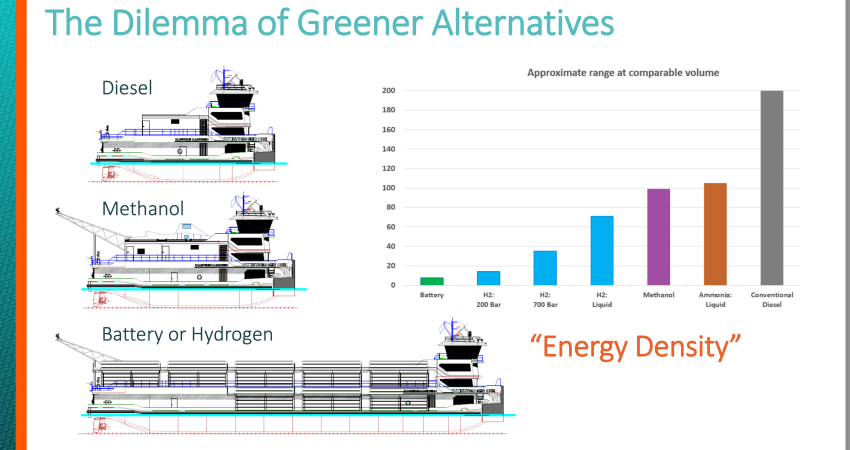The Diesel Difference Panel at Pacific Marine Expo 2024 sparked some thought-provoking questions after diesel mechanic Karl Pettersen, service manager at Northern Lights, and naval architects Christian Stark and Mike Complita shared their perspectives on diesel efficiency and the future of alternative fuels and electrification.
“Much of my input was focused on alternative fuels for combustion engines and advances in the reforming technology for methanol and ammonia,” said Complita, of Elliott Bay Design Group, Seattle. “Wartsila, MAN and Caterpillar are all working on engines that can burn methanol, LNG and other fuels, but the roadblock to that is that many of these options are not EPA certified, and it will take some time before they are available here in the U.S.”
The reforming technology Complita described extracts hydrogen out of methanol and ammonia and puts it into fuel cells that power electric motors. “Right now, the technology is complicated and very expensive. You have to have the machinery, the fuel cells, and of course the batteries to store the energy, but it’s in the development stage, and several demonstration projects are presently being built around it,” he said.
Of course, the audience asked which of these technologies is right for the fishing industry. “We all on the panel agreed that it depends on your vessel and your fishing profile.” Complita demonstrated this with a graphic showing how far a vessel could go on the various fuels and how much space each system would need on a vessel.
Complita noted that most of his work has been aimed at the non-fishing sector. “Unfortunately, but realistically, the day when these technologies are appropriate for fishing is still far off.”
Based on this, the panel also suggested several interim measures owners could take to see immediate and measurable improvements, such as keeping the bottom of the vessel clean and using different bottom paints. “One thing I learned from Christian that I was not aware of was in regard to diesel engine sensitivity to fuel quality. Apparently, the Tier III engines are very sensitive,” Complita said.
The fuel topic led to the question of availability of these fuels and parts for engines that can burn them. “You don’t want to be stuck waiting for a part for an exotic engine,” said Complita. “Or find that your particular fuel is not available in remote areas.”
Panelist Christian Stark of Aurora Marine Design, San Diego, noted that what fishermen want is reliability and diesel is the safest bet. “Fishermen are pushing the edge on lower emissions and hybrid power,” said Stark. “I advised the audience to do their research and have a clear plan for what they want to do with their vessel before thinking about electric.”
Nonetheless, Stark pointed out that there may be hidden benefits to having an electric propulsion system on board. “It might get you home if you have a problem with your engine, or at least keep you in place while you work things out. It depends on how much battery power you have, and I mentioned that there are much safer battery options out there now.”
On alternative fuels, Stark noted that methanol seems to be the one people are most focused on. “But we don’t know how long it will be until that is available,” he said. “I think the best advice for fishermen right now is maintenance and the use of remote monitoring to get the most out of your engine. The thing is that with some of these systems, you can look for certain things that happen together that mean something else is going to happen and you can teach the analytics to see that and issue a warning.”
Stark noted that engineers can do that if they have time to check all the data, but they usually don’t. “But AI and machine learning can do it,” he said.







